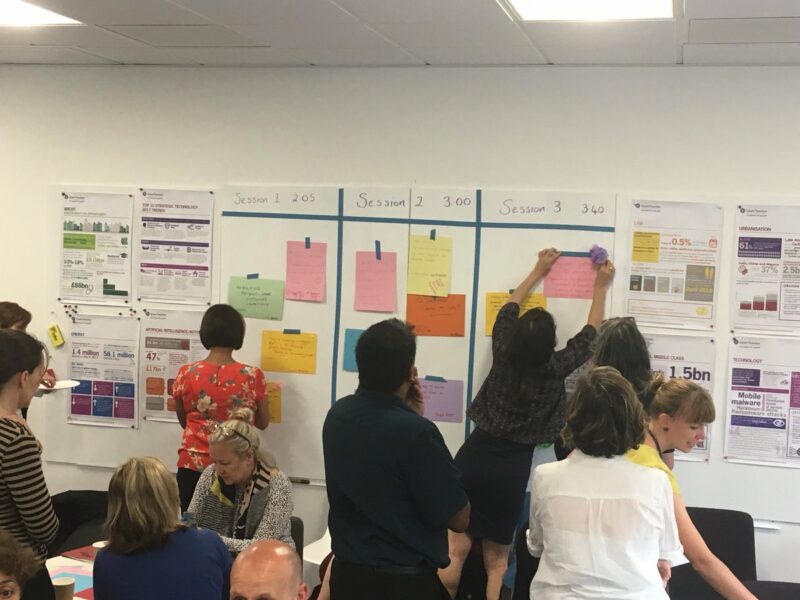In Wessex, Q members gather quarterly, with agendas led by different members of the community. For our summer meeting this year, two founding members of Q (Catherine Pope and Sarah Williams) decided to try an unconference, sometimes called an open space meeting or mini hack.
We were keen to try this to give our local network of quality improvers the opportunity to discuss and share topics that were important to them, and to allow for the co-creation of energy, ideas and learning . Rather than host a typical conference where presenters speak to or at an audience, we wanted to start conversations and interactions within our network. Sarah and Catherine had participated in the community open space facilitated by Chris Lake, previously at the NHS Leadership Academy, and we borrowed from this and many other ideas shared on Twitter to create a half day event.
Community open space, Q Design event from The Health Foundation on Vimeo.
In an unconference the topics for discussion are set by the attendees at the beginning of the meeting and those who want to begin a conversation on a topic choose a time and a space. Nearly 40 people attended – a mix of old and new Q community members and others keen to join – from a range of backgrounds. This included clinicians, managers, those working in community and acute health as well as social care, and those with significant improvement roles in their day jobs as well as those with small projects, or just a deep ambition to make things better for patients/service users.
At the end, the group reconvened for feedback and it was clear that we had used the expertise in the room, and lots of learning and swapping of tips and techniques for improvement work had taken place even in the limited time available.
We asked attendees to have a brief initial discussion and to write a simple improvement topic or question they wanted to have a conversation about. To jazz this up we provided coloured paper, pens and a heap of craft materials – this certainly seemed to help create a buzz in the room right from the start. We were helped by holding the meeting in a creative and collaborative workspace and attendees were encouraged to make full use of the different seating areas and pods. One adventurous group opted for a walking meeting.
Conversation topics included:
- Fun ways to engage healthcare teams in quality improvement
- Do you need a change method to make an improvement?
- How do we keep track of all the quality improvement projects and ideas we are doing?
- How do I get Allied Health Professionals/ junior doctors/ patients/ or my team engaged with quality improvement ideas?
- Which is better: PDSA or audit?
- How do I provide compassionate support for staff involved in adverse events?
- How to measure patient and staff outcomes and experience
- Improving communication from primary care along the patient pathway
- How to win in Q EXCHANGE!!
Topic-proposers picked a time slot and venue for their conversation and displayed the topics on a large whiteboard so attendees could choose. The main instructions were: this is an unconference so do what suits you, move conversations if you want, sit out if you need to, take a few notes to report back and, above all, enjoy. We allowed 3 x 35 minute sessions and any fear that no one would talk proved unfounded as a series of energised conversations ensued.
At the end, the group reconvened for feedback and it was clear that we had used the expertise in the room, and lots of learning and swapping of tips and techniques for improvement work had taken place even in the limited time available. We unearthed more creativity in feedback-posters so that the resulting display was a riot of colour and feathers.

This blog is not really the space to do justice to the ideas generated, but to give you a flavour, the some of the things put forward were:
- Finding joy in work
- Using the onion approach to keep track of your projects – just peel one layer at a time
- Making more use of stories to hook people into improvement ideas
- Using voting buckets to help people set priorities – the simple ideas often work the best
Alongside these ideas, other terms and techniques shared included emotional mapping, real time patient feedback and SWOT (Strengths, Weaknesses, Opportunities and Threats) analysis. All in all it was a very stimulating afternoon and from the evidence of people sharing Twitter names and email addresses we think our unconference has sparked some improvement conversations that will continue!
Our thanks go to the team at Wessex Patient Safety Collaborative, which supports the Wessex Q network, and to all the attendees.
#QWessex